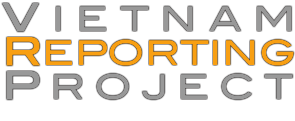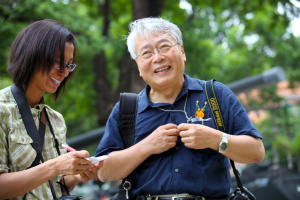This blog post first appeared on SFGate’s “City Brights” blog on Aug. 18, 2010.
By Yumi Wilson
As for me, all I know is that I know nothing. — Socrates
Before my trip to Vietnam, where my mission had been to investigate the link between Agent Orange and third-generation birth defects and disabilities, I read lots of books and articles. Watched tons of movies and documentaries. And interviewed as many people as I could. I even tried to learn some Vietnamese.
But in the end, I learned that the that one of the most important things I could have done was to know a little bit more about Japan.
At a well-attended ceremony outside the War Remnants Museum in Ho Chi Minh City, I spotted Goro Nakamura. I had been told by local photographer Le Quang Nhat that Nakamura, a photographer and author, was being honored on Agent Orange Day (Aug. 10) for his work in Vietnam, and that I, as a daughter of a Japanese woman who survived WWII, should talk to him.
So I did. Or at least, I tried. “Watashi-no haha wa Nihon-jin deshita.” I knew my grammar and sentence structure was quite poor, but Nakamura was kind enough not to correct me. Instead, he leaned closer and spoke in English, explaining that he never imagined that Agent Orange would have such a long-lasting effect on the people of Vietnam.
“The aftermath of Agent Orange is something I couldn’t see during the war,” Nakamura said. “Nobody died. Not right away. Decades later, many people now have cancer, their babies are born with deformities … and this is similar to the tragedy of Hiroshima and Nagasaki.”
As soon as he said Hiroshima and Nagasaki, I thought back to a recent front-page article in the International Herald Tribune. Martin Fackler’s piece, with a dateline of Hiroshima, talked about how some survivors wanted President Barack Obama to visit the city, not to apologize, but to build upon his 2009 commitment to “seek the peace and security of a world without nuclear weapons.”
There have been fears that an apology debate could open historical wounds by exposing the differing views of the atomic bombings in the United States and Japan, now one of Washington’s closest allies. While many Americans say the bombings were justified as a means to end the war, many Japanese see them as the epitome of the indiscriminate slaughter of modern warfare, and a key reason for the nation’s post-war pacifism.”
This, in fact, is what many people in Vietnam, said when I asked whether their disabilities came from Agent Orange.
“Honestly, I don’t care about the reason,” said the director of a blind school where many of the children exhibit conditions related to Agent Orange. “I just care about the education and care for the children.”
Helping people, Nakamura added, is why he has come back to Vietnam dozens of times, and why he will always come back.
And this may be the reason why I will learn a little more Japanese – and embrace my own connection to Vietnam.







